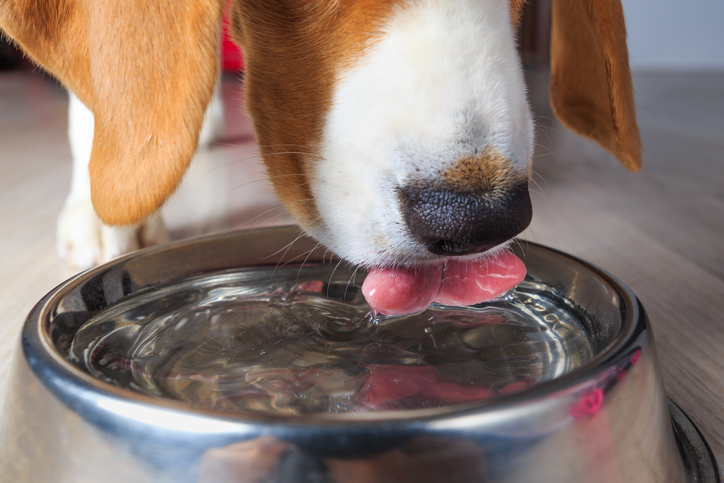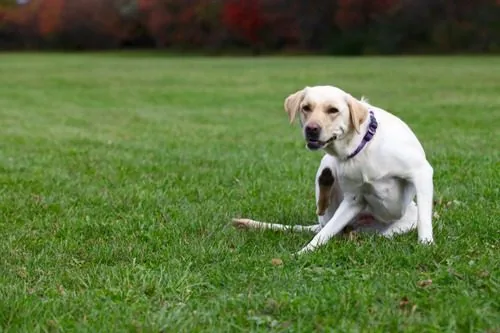Dehydration in Dogs: Signs and What to Do
Dehydration is a very serious condition in dogs. A dog who is dehydrated for as little as a couple of days may be at a severe risk of unconsciousness or even death depending on the cause of the dehydration.

6 Signs of Dehydration in Dogs
As a responsible pet owner, it’s important for you to learn how to recognize signs of dehydration in your dog. Read through the list below and find out more about the most common symptoms associated with this condition so you can tell if your dog is ever dehydrated.
Some common signs that your dog may be dehydrated include:
Dry or Sticky Gums
One of the first signs of dehydration in dogs is a change in the texture of their gums. If your dog’s gums have become very dry suddenly, this is a good sign she is dehydrated. On the other hand, if her gums are sticky, this may mean the same thing.
If your dog’s gums have changed color or appearance, this is an even more concerning sign. This usually means dogs are not getting enough oxygen in their bloodstream and may be on the verge of unconsciousness. Take your dog to the emergency vet immediately if you notice this.
Lack of Skin Elasticity
Try pulling up the skin on your dog’s back, near her hips. It should spring back down into place almost right away if she is healthy and hydrated. However, in a dog who is dehydrated, this skin will take a while to go back to normal and will continue looking raised or peaked for a few seconds after you pull it. This means there is a lack of skin elasticity.
This is one of the most common signs of dehydration in dogs, and will probably be one of the first things the veterinarian will do to check your dog for dehydration as well.
Thick Saliva
You’re probably aware of what the consistency of your dog’s saliva is like. If you’ve ever been licked by your dog or have seen her drooling after intense exercise periods, you’ve seen her drool and you know how stringy and wet dog saliva normally is.
A dog who is dehydrated may drool a lot, but the drool will be thick and not the same consistency as it normally is. This symptom usually goes along with changes in your dog’s gums, and you can check both of these at the same time too.
Dry Nose
A dry nose doesn’t always necessarily mean your dog is dehydrated. It can mean any number of things ranging from fever or the presence of nasal tumors to something as simple as having the heater turned on during the winter. However, if your dog has a dry nose along with any of the other symptoms listed here, this may mean she is dehydrated.
If your dog’s nose is so dry that the skin on it has cracked, this may mean she is running a high fever. It can, however, sometimes also be a sign of diabetes in dogs as well.
Heavy Panting
Heavy panting may be a symptom of a variety of conditions in dogs. It is commonly associated with heatstroke, but it can occur with many other issues as well. If your dog is panting heavily with none of the other symptoms on this list, you may need to look for a different cause. However, heavy panting along with other symptoms listed here may signify dehydration.
If you notice your dog panting heavily and see that her breathing doesn’t return to normal in a few minutes, you should contact the emergency vet. Even if dehydration isn’t the cause, there is clearly something wrong with her breathing that needs to be examined.
Lethargy and Weakness
Finally, a dehydrated dog will become lethargic and weak very quickly. Dogs may be unable to stand up at all or may even fall into unconsciousness depending on how severe the dehydration becomes. Other dogs may remain conscious but may do nothing more than lay on the floor due to their lethargy.
Dogs who are suffering from these symptoms likely won’t have the energy to get up and drink water. Because of this, they will need to be treated by an emergency vet who can provide IV fluids for them instead.
What to Do if You Think Your Dog is Suffering from Dehydration
If you think there is any chance of your dog being dehydrated, don’t wait to take her to the vet. Dehydration is very concerning in dogs and can quickly turn fatal. With the help of a trusted vet, however, you can get your dog back on her feet again with little to no lasting damage.
Of course, if your regular vet is not available, you will need to take your dog to the emergency vet instead. The emergency vet will be able to help by giving your dog IV fluids and working to diagnose the underlying cause of the dehydration as well.
With multiple animal hospitals located in Atlanta, GA and surrounding areas, The Village Vets offers both general veterinary care as well as 24 hour emergency vet care at our Decatur location. If you have questions about what to do for your pet, don’t hesitate to contact our team. We’ll provide your dog with the care they need to get them back on their feet.
Recent Posts
About The Village Vets
The Village Vets is a network of animal hospitals based in Atlanta, GA and the surrounding area. We offer honest, excellent service to our clients in a comfortable, friendly atmosphere. To learn more about our locations and how we can better serve you and your pet, click the button below.
Share This Post
Recent Posts
About The Village Vets
The Village Vets is a network of animal hospitals based in Atlanta, GA and the surrounding area. We offer honest, excellent service to our clients in a comfortable, friendly atmosphere. To learn more about our locations and how we can better serve you and your pet, click the button below.



